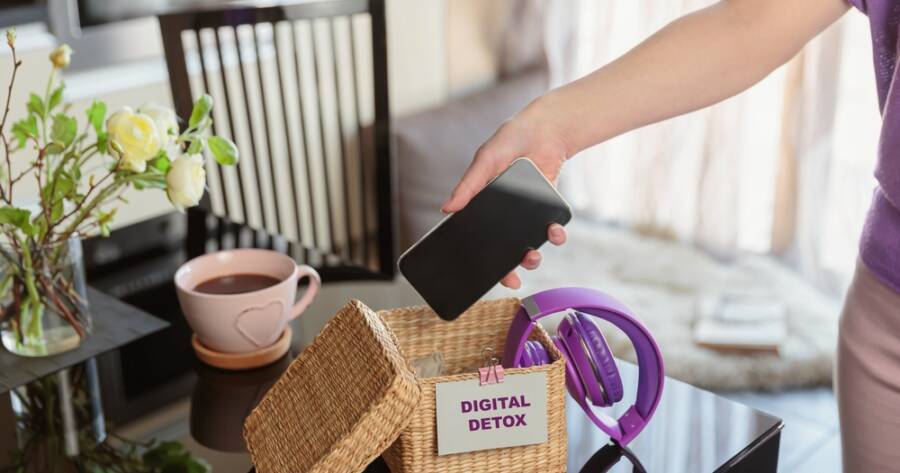In today’s fast-paced world, digital devices have become a constant companion. While technology has undeniably transformed our lives for the better, there is growing concern about its impact on mental and physical well-being. This has led to the rise of digital detoxing, a practice aimed at disconnecting from the constant buzz of screens. But how can we unplug, and what benefits await when we do?
The Need for a Digital Detox
With social media, work emails, and constant notifications, it’s easy to become overwhelmed by the digital world. The more we rely on our devices, the harder it becomes to take a break from them. For many, this constant connection leads to stress, anxiety, and even burnout.
Digital detoxing is about intentionally disconnecting from technology to give the mind and body a much-needed break. This practice isn’t just about turning off your phone; it’s about finding a healthier balance between the digital world and the real world. Many people are realizing that spending too much time online affects their relationships, sleep, and productivity, making detoxing an increasingly popular choice.
How to Start a Digital Detox
Starting a digital detox doesn’t require a drastic change overnight. In fact, it’s best to begin with small, manageable steps. For example, you can start by setting specific times when you put your phone away—perhaps during meals or before bed. This allows you to enjoy moments without distractions and helps build a routine that encourages mindful screen time.
Another effective approach is to designate one day a week as a “no-tech” day. On this day, you could engage in activities like hiking, reading, or spending time with loved ones without the interference of digital devices. The goal is not to eliminate technology entirely, but to create moments of balance and recharge.
For some, a more intense approach, like a weekend retreat or vacation with no digital devices, may be beneficial. This kind of break can help you fully immerse yourself in the moment and experience the world without the constant pull of screens.
The Benefits of Digital Detoxing
When you step away from your devices, the benefits can be profound. First and foremost, digital detoxing can significantly reduce stress and anxiety. With fewer notifications and distractions, you have more mental space to relax and focus on what’s truly important. Over time, this can lead to greater clarity and a reduction in digital fatigue.
A digital detox can also improve sleep. Studies show that excessive screen time, especially before bed, can interfere with your ability to fall asleep. The blue light emitted by devices can disrupt your natural circadian rhythms, making it harder to rest. By cutting back on technology in the evening, you give your brain a chance to wind down naturally, leading to better sleep quality.
Additionally, unplugging allows for deeper connections with others. When you’re constantly on your phone or computer, you may miss out on meaningful face-to-face interactions. Taking time to unplug can help you foster stronger relationships, whether with family, friends, or colleagues. The simple act of giving your full attention to someone without the distraction of a screen can make all the difference in building trust and understanding.
Overcoming the Challenges of Digital Detoxing
Although the benefits are clear, the idea of digital detoxing can be intimidating for many people. One of the biggest challenges is fear of missing out (FOMO). People often feel the need to stay connected in case they miss important news, events, or conversations. However, it’s important to remember that the world will still go on, and the information you need will find its way to you.
Another challenge is habit. For many, checking their devices has become second nature, almost like an automatic reflex. Breaking this habit takes time, and it’s okay to ease into it. One strategy is to replace screen time with other activities that offer a sense of fulfillment. Whether it’s reading a book, exercising, or simply going for a walk, filling your time with enriching activities can make the transition easier.
Setting clear goals and intentions for your digital detox will also help. Ask yourself why you want to take a break from technology and what you hope to achieve. Whether it’s reducing stress, improving your mental health, or simply recharging, having a clear purpose will keep you motivated and committed to the process.
The Long-Term Impact of Unplugging
The positive effects of digital detoxing extend far beyond the immediate benefits of reduced stress and better sleep. Over time, unplugging from technology can lead to a deeper sense of self-awareness and mindfulness. When you step away from the constant stream of information, you allow yourself to reconnect with your inner thoughts and emotions.
Additionally, digital detoxing can help you reclaim your time. With less time spent on screens, you can rediscover hobbies, learn new skills, or spend more time on the activities that truly matter. Many people report feeling more productive and focused after taking a break from their devices, as they are able to dedicate their attention to tasks without constant distractions.
Perhaps one of the most profound long-term benefits is the potential for improved mental health. Disconnecting regularly from the digital world can reduce feelings of comparison, anxiety, and depression, which are often exacerbated by social media. By embracing a more balanced lifestyle, you create space for growth and healing that isn’t dictated by the pressures of the online world.
Embracing a Balanced Approach to Technology
The rise of digital detoxing reflects a growing awareness of the impact technology has on our well-being. While technology is undoubtedly an essential part of modern life, learning to unplug for a while is just as important.
By starting small, setting clear goals, and embracing the benefits of disconnection, you can reclaim your time, improve your mental health, and build deeper connections with the world around you.

